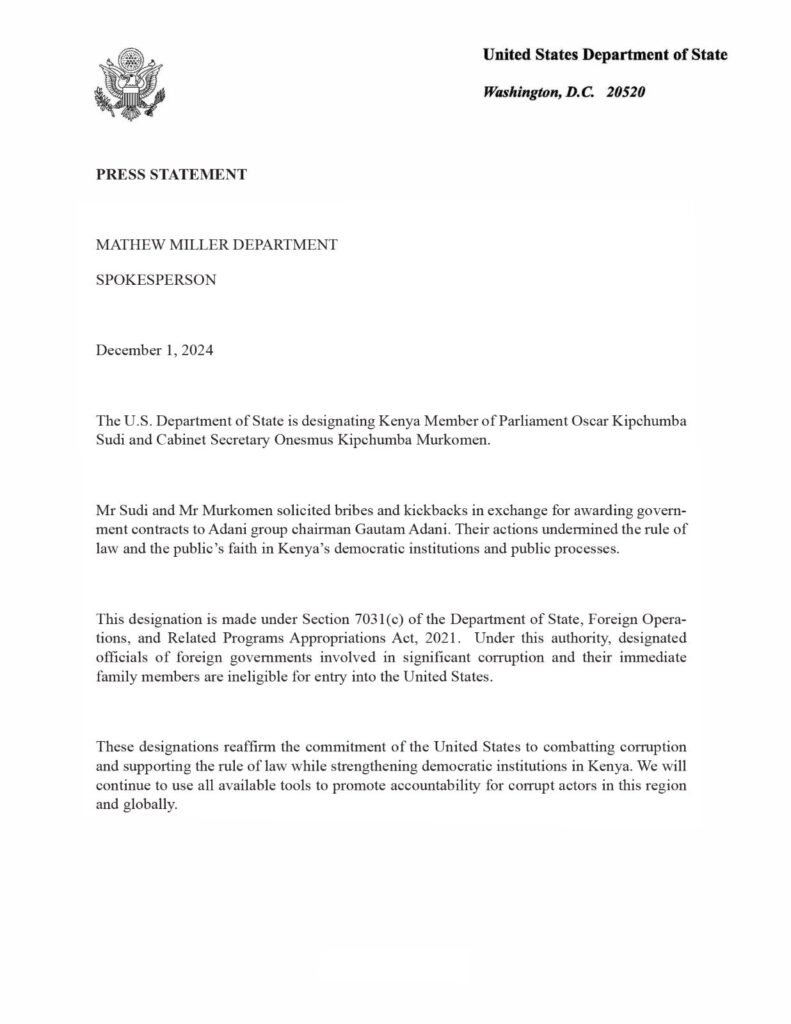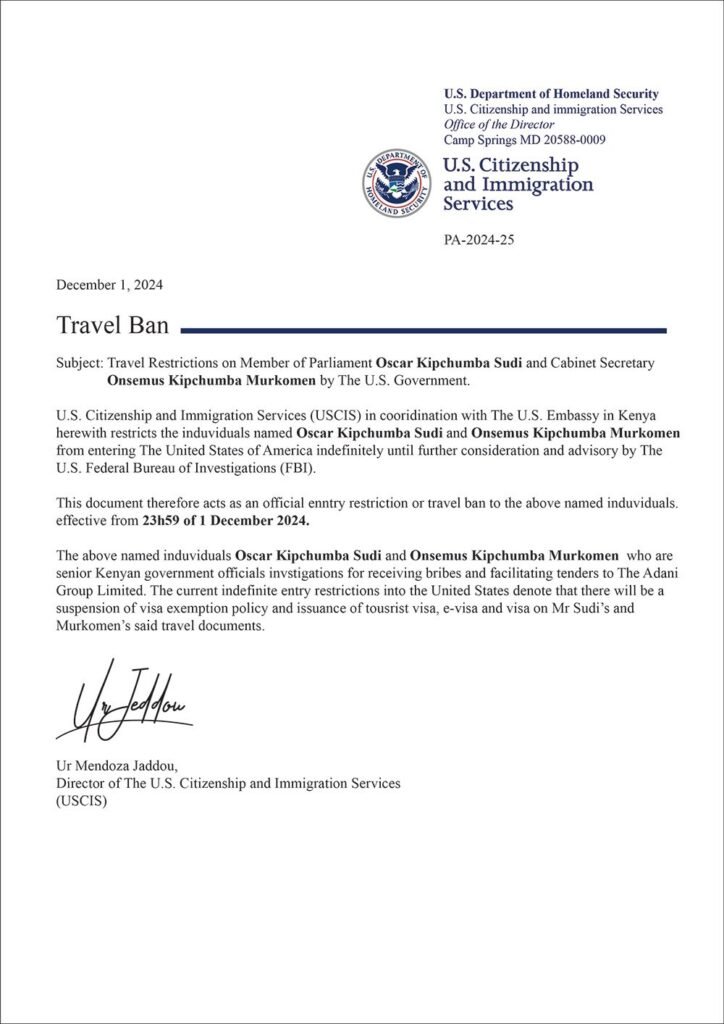

The recent travel ban imposed by the United States on Kenyan politicians Kipchumba Murkomen and Oscar Sudi has sparked widespread discussion and contemplation regarding its implications for Kenya and its governance. Kipchumba Murkomen is a prominent political figure known for his affiliation with the Jubilee Party and positions in the Kenyan government, including serving as the Senate Majority Leader. Oscar Sudi, on the other hand, is also a recognized political personality, having been a vocal advocate in the Rift Valley region and holding a parliamentary seat. The decision by U.S. authorities to impose a travel ban on these individuals signifies a response to concerns regarding issues such as corruption and human rights abuses within their political actions.
The travel restrictions are reflective of broader international efforts to promote accountability and good governance, particularly among political leaders in various countries. This ban raises pertinent questions about the responsibilities of elected officials and the potential repercussions they face from international bodies when their conduct comes under scrutiny. The implications of such restrictions extend beyond personal travel; they could foster a sense of political caution among other leaders, encouraging adherence to ethical standards and accountability.
This blog post will delve into the complexities surrounding the travel ban on Murkomen and Sudi, exploring its implications for Kenya’s political landscape. We will analyze the reasoning behind the ban, the reactions from the affected politicians and the Kenyan populace, and the potential lessons that can be learned regarding governance and international relations. Furthermore, we will assess how such actions may influence future political behaviors in Kenya and promote discussions on corruption, governance, and the importance of adherence to democratic principles.
Overview of the Travel Ban
The U.S. travel ban imposed on Kenyan politicians Kipchumba Murkomen and Oscar Sudi has garnered significant attention, raising questions about its implications for diplomatic relations and domestic politics in Kenya. The ban is rooted in specific U.S. laws aimed at addressing corruption and human rights violations. In this case, the sanctions are believed to be a response to alleged unethical practices and actions that contradict democratic values. The U.S. government has a history of employing travel bans as a tool to uphold its foreign policy objectives, particularly when it involves individuals deemed to engage in corruption or to undermine democracy.
According to the U.S. Department of State, the travel restrictions were enacted under the Global Magnitsky Human Rights Accountability Act, which allows the U.S. to sanction foreign officials implicated in significant corruption or human rights abuses. This legislative framework illustrates the United States’ commitment to promoting good governance and safeguarding human rights worldwide. In the case of Murkomen and Sudi, U.S. officials specifically cited concerns regarding their alleged involvement in corrupt practices that have ramifications for the rule of law in Kenya.
Official statements from U.S. representatives highlight the importance of integrity and accountability among public officials. The travel ban serves not only as a punitive measure but also as a warning to other political figures who might be tempted to engage in similar misconduct. By implementing such sanctions, the United States aims to encourage positive reforms and to reinforce its stance against impunity. The implications of this travel ban extend beyond the individuals directly affected; they resonate within the broader context of Kenya’s political landscape and its relationship with the United States.
Who Are Kipchumba Murkomen and Oscar Sudi?
Kipchumba Murkomen is a prominent Kenyan politician and attorney, recognized for his significant role in the country’s political landscape. Born on 28th December 1980 in Elgeyo Marakwet County, Murkomen ventured into politics after establishing a career in law. He was first elected as the Member of Parliament for Elgeyo Marakwet in 2013 and later assumed the position of the Senate Majority Leader. His legal background has been a valuable asset, enabling him to navigate complex political challenges effectively. Throughout his career, Murkomen has been a strong supporter of President William Ruto, often taking a vocal stance on various national issues, which has solidified his influence among the politicians of the region. Additionally, Murkomen is known for his advocacy towards socioeconomic development and his commitment to improving local infrastructure.
Oscar Sudi, born on 14th December 1981 in Kapseret, Uasin Gishu County, is another influential figure in Kenyan politics. Like Murkomen, Sudi’s rise in the political arena began when he was elected as the Member of Parliament for Kapseret in 2013. His career has been marked by a staunch loyalty to Ruto and a focus on youth empowerment and economic growth. Sudi’s public persona is characterized by his grassroots mobilization efforts, which resonate with many Kenyans, particularly the youth. He has also been involved in various initiatives aimed at addressing local concerns, enhancing his popularity among constituents. However, both politicians have also faced their share of controversies, which occasionally garner criticism and intensify scrutiny regarding their political activities.
Understanding the backgrounds of Kipchumba Murkomen and Oscar Sudi provides essential context to their political actions, especially their stance that may have contributed to the recent U.S. travel ban they encountered. Their influence within the Kenyan political framework highlights the complex dynamics of loyalty, governance, and international relations.
Political Context in Kenya
The political landscape in Kenya is characterized by a multitude of challenges, including governance issues, corruption allegations, and shifting public sentiments. In recent years, the Kenyan government has faced significant scrutiny both domestically and internationally, particularly regarding the integrity and accountability of its leaders. The U.S. travel ban on prominent figures like Kipchumba Murkomen and Oscar Sudi indicates a tangible reflection of these ongoing concerns.
Governance in Kenya is often fraught with accusations of mismanagement and corruption, which have led to increasing public discontent. Polls suggest that many citizens view political leaders as out of touch with the challenges faced by ordinary Kenyans, such as unemployment and economic inequality. The U.S. decision to impose a travel ban could be seen as a response to the negative perception of governance in Kenya, leading to questions about the commitment of its leadership to uphold democratic principles and human rights.
Recent political events have further illustrated the polarized nature of Kenyan politics. The rivalry between political factions, notably those aligned with major political figures, has culminated in heated exchanges and accusations. This atmosphere of contention may have influenced the U.S. to reevaluate its diplomatic stance and apply pressure on those it perceives as undermining democratic values. Public opinion towards Murkomen and Sudi has been mixed, with segments of the population expressing support, while others raise concerns about their roles in perpetuating political patronage and corruption.
Moreover, the broader context of U.S.-Kenya relations has been shaped by geopolitical dynamics in the East African region. As the United States seeks to foster stability and encourage good governance in countries worldwide, the actions taken by Washington regarding specific Kenyan leaders can have significant ramifications. Understanding this political backdrop is essential to grasp the deeper implications of the travel ban and the lessons that can be drawn for Kenya’s future trajectory.
Implications for Kenya-U.S. Relations
The recent travel ban imposed by the United States on Kenyan political figures Kipchumba Murkomen and Oscar Sudi has raised significant concerns regarding the future of diplomatic relations between Kenya and the U.S. Historically, the United States has maintained a strategic partnership with Kenya, focusing on political stability, economic development, and security cooperation. However, this ban may complicate those ties, prompting a reassessment of mutual interests.
One immediate implication is the potential strain on Kenya’s political landscape. With the travel ban targeting key political figures, there may be a sense of alienation among their supporters, which could influence public perception of U.S. involvement in local affairs. In turn, this might ignite nationalistic sentiments that could derail collaborative initiatives essential for economic cooperation and regional security. The U.S. has often positioned itself as a reliable partner in addressing issues like terrorism and trade; the evolving narrative surrounding these bans calls for careful navigation by both countries to prevent further diplomatic fallout.
Furthermore, this travel ban could signal a shift in U.S. foreign policy toward Kenya. As the U.S. aims to promote democratic governance and human rights globally, the actions against Murkomen and Sudi may establish a precedent for future relations with other nations. The ramifications of the ban may reach beyond bilateral engagements, affecting U.S. interests in the East African region, where maintaining influence and stability has been pivotal. Consequently, the relationship may undergo changes in both diplomatic and economic priorities as the U.S. reviews its strategies and partnerships in light of recent developments.
Ultimately, the travel ban’s implications for Kenya-U.S. relations underscore the necessity for constructive dialogue to mitigate tensions, ensuring that both countries can continue to collaborate on shared objectives while addressing underlying grievances.
Reactions from Political Figures and the Public
The recent travel ban imposed by the United States on Kenyan politicians Kipchumba Murkomen and Oscar Sudi has sparked diverse reactions across the political spectrum and among the general public. Within Kenya, government officials have largely defended the individuals affected by the ban, viewing it as an unwarranted interference in the nation’s affairs. Supporters of Murkomen and Sudi emphasize the importance of sovereignty and criticize the U.S. action as an affront to Kenyan leadership. They argue that the ban undermines diplomatic relations and reflects poorly on U.S. engagement with African nations.
Conversely, opposition figures have seized the opportunity to criticize the government and the political establishment. Many express concern regarding possible allegations of corruption and human rights violations associated with the ban. Notably, figures from opposition parties have openly questioned the integrity of the leadership and suggested that the travel restrictions could be indicative of deeper issues within the political framework of Kenya. This divide underscores a broader narrative on governance and accountability in the country.
Public sentiment regarding the ban showcases significant polarization. Social media platforms are rife with opinions, with many users voicing their support for the travel restrictions in light of allegations against Murkomen and Sudi. Hashtags related to the ban trended on platforms like Twitter and Facebook, often framing the discussion around the necessity of good governance and transparency for Kenyan politicians. However, there is also a substantial demographic that perceives the ban as politically motivated rather than a genuine expression of concern over governance issues.
Overall, the travel ban has not only generated robust discussions among political figures but has equally resonated with the public. As sentiments continue to evolve, the implications of this ban will likely remain a point of contention within Kenyan political discourse.
Lessons Learned from the Travel Ban
The recent travel ban imposed by the United States on Kenyan political figures Kipchumba Murkomen and Oscar Sudi serves as a critical juncture for assessing the governance landscape in Kenya. This incident emphasizes the paramount importance of accountability and transparency in governance structures. When political leaders engage in actions that undermine democratic principles, they not only erode public trust but also expose themselves to international scrutiny. Such measures can significantly impact a country’s global standing, as seen through the lens of this travel ban.
Moreover, the influence of international law and human rights standards cannot be understated in this context. The application of the travel ban reflects a broader trend where international bodies hold politicians accountable for their actions. It underscores the idea that leaders must operate within a framework that respects human rights and democratic norms. The repercussions of failing to comply with these standards extend beyond personal sanctions; they can also influence foreign relations and international aid dynamics, both crucial for Kenya’s development.
For future Kenyan politicians, these developments serve as a cautionary tale highlighting the need for ethical leadership. Political actions, particularly those perceived as corrupt or unjust, can attract undesirable attention and repercussions on both local and international fronts. This scenario encourages a deeper discourse about the necessity of ethical governance mechanisms tailored to promote integrity and accountability among political leaders.
Ultimately, the lessons learned from this travel ban experience provide a roadmap for enhancing governance practices in Kenya. They illustrate the potential consequences of political actions, urging current and future leaders to prioritize transparency and uphold democratic values. Engaging in ethical governance will not only strengthen political institutions but also foster a more stable political environment conducive to national progress.
Future Prospects for Murkomen and Sudi
The travel ban imposed by the United States on Kipchumba Murkomen and Oscar Sudi has significant implications for their political careers and future prospects within Kenya’s ever-evolving political landscape. As prominent figures in the Kenyan political arena, both individuals must navigate the challenges posed by this restriction, while also considering the responses available to them. One immediate option is to publicly address the ban, potentially framing it as an attack on their political legitimacy and an infringement on sovereignty. Such a stance may resonate with their supporters, thus reinforcing their political base while also attracting attention to their grievances.
In addition, Murkomen and Sudi could seek to collaborate with regional allies to showcase their standing within Kenya, emphasizing that their contributions to national politics extend beyond any U.S. judgment. They may also leverage local media to bring attention to their narratives, framing the situation as a broader issue concerning Kenya’s relationship with the U.S. Such an approach might not only consolidate their appeal domestically but also demonstrate resilience to international scrutiny.
While responding to the travel ban, it is crucial for both politicians to consider their long-term strategies for re-engaging with U.S. policymakers. They may embark on diplomatic outreach, seeking to mend relations by highlighting their dedication to positive reforms and cooperation. This may involve leveraging back channels or engaging international relations consultants to improve their global image.
Ultimately, the performance and response of Murkomen and Sudi in the aftermath of the travel ban could shape their reputations and their careers for years to come. Their ability to navigate these complexities may not only influence their political futures but also leave an indelible mark on the political dynamics in Kenya. As such, close attention should be paid to how these developments unfold in the coming months, offering insights into the broader implications for Kenyan politics.
Conclusion
The recent U.S. travel ban imposed on Kenyan politicians Kipchumba Murkomen and Oscar Sudi serves as a critical event with multifaceted implications that extend beyond the political arena. This prohibition highlights the vital intersection of local political actions and their international ramifications. The decision by the U.S. government signifies a notable shift in diplomatic relations and signals to Kenyan leaders the importance of maintaining ethical governance and accountability at home.
This incident not only affects the individuals involved but also reverberates throughout the fabric of Kenyan politics. It raises significant concerns regarding the standards of leadership expected from public servants and the overarching consequences of their actions, particularly when they deviate from democratic principles or engage in corrupt practices. As such, this travel ban serves as a cautionary tale, emphasizing the necessity for transparency and integrity among political figures in Kenya, especially given the scrutiny by international bodies.
Moreover, the ban underlines the potential for international relations to influence domestic politics. It illustrates how external actors, such as the U.S. government, can exert pressure on national leaders to adhere to democratic norms or face repercussions. This interconnectedness signifies that the decisions made by Kenyan politicians resonate beyond their borders, impacting not just their political futures but also the international standing of Kenya itself.
In reflection, the U.S. travel ban on Murkomen and Sudi offers pivotal lessons for current and aspiring leaders in Kenya. It advocates for a culture of responsibility and ethical governance, reminding all stakeholders in the political landscape of the consequences that arise when local actions transgress accepted norms. Ultimately, understanding these dynamics is essential for fostering a political environment that prioritizes integrity and accountability, contributing to a more stable and reputable Kenya on the global stage.



